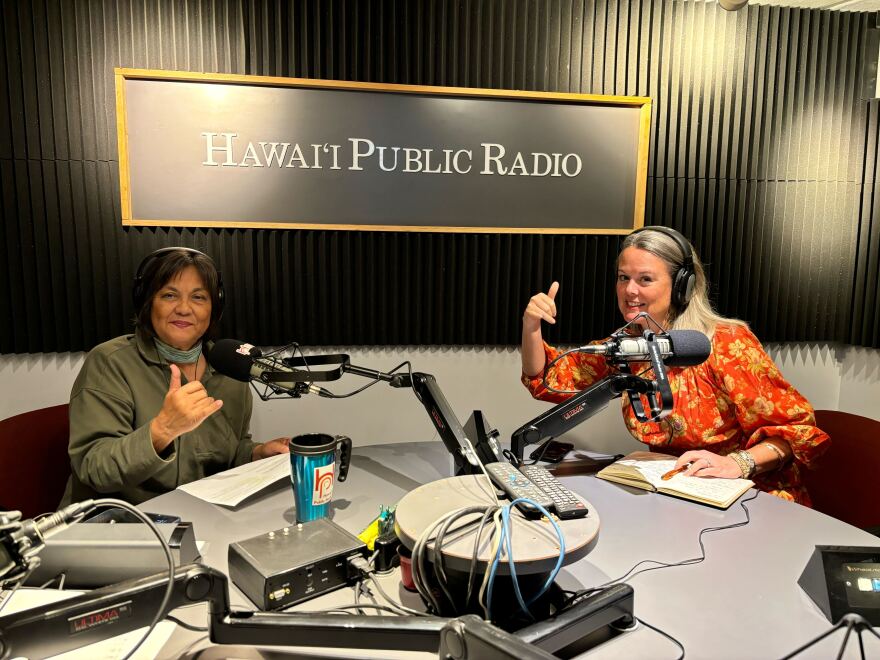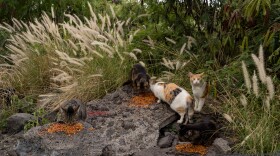Hawaiʻi Public Radio President and CEO Meredith Artley stepped into the job earlier this month following José A. Fajardo's retirement.
Artley sat down with Catherine Cruz on Wednesday to discuss her career history, the leadership transition, and her vision for HPR's future.
CATHERINE CRUZ: Good morning.
MEREDITH ARTLEY: Aloha, good morning, Catherine.
CRUZ: You know, I was here for seven of those eight years that José was here, and, you know, just watching the progress, you know, strengthening our signal across the state and really strengthening our newsroom have been two really key points in his tenure here.
ARTLEY: He's incredible, and we're still in touch on a regular basis. So I know all the staff is grateful for that, and I know all of our listeners are grateful for his leadership of this remarkable team. I mean, this is, this is week three for me, so I'm still figuring out where the light switches are, as you well know, but I'm just struck by this incredible commitment and creativity that you, Catherine, The Conversation team, the whole staff have for what we get to do at HPR. And so I'm just, I'm grateful to you and José and everyone who's built that. I mean, what a great, essential public service this is.
CRUZ: Yes, and you know, watching, to see, you know, what Michael Titterton did, you know, before José Fajardo and the mainstays, right, a lot of our hosts who really helped to build this from the ground up.
ARTLEY: Oh, man. I mean. It's great you mentioned Michael, too. You know, it's funny, I've noticed at different points in my career, and maybe you've seen this as well, where a new leader will come in, and it's almost like the past hasn't happened. They don't necessarily talk about the people and the decisions and the learnings that got whatever the institution is to where it is today, and when I stepped into this role, I really wanted to make a commitment to honor where HPR has been. I mean, it's one of the reasons that all of us want to work here, and it's one of the reasons that people love to listen to us and access us online and engage with us out in the communities. So just, I feel like it's one of those life leadership lessons, like, acknowledge who has come before you and what they have built — and build on that, you know, and don't ignore that, but just be grateful for it.
CRUZ: And, you know, the arts are big in our programming, you know, with the classical side and all. And before you came here, you were the interim head over at the Doris Duke Shangri La Museum.
ARTLEY: Yeah, I had this kind of convoluted, wordy title, which was the interim executive director for Shangri La and the executive in residence at the Doris Duke Foundation. And it was, you know, it's incredible. It's an institution, a different kind of institution in Hawaiʻi. And just, you know, you've been there, we were talking about it earlier, and the stories, the complexities, the layers of Shangri La are just remarkable. And they've got a great leader there in their new Executive Director Ben Weitz, and the CEO of the Doris Duke Foundation is Sam Gill. I think he's in town, because he's going to buy me a cup of coffee on Friday. So, you know, it's, I just feel like Shangri La is a great example of other remarkable places in Hawaiʻi that need to be increasingly for kānaka and kamaʻāina.
CRUZ: I shared with you, when I was up in your office a little while ago, that when I was a city hall reporter, I remember doing a story about how Doris Duke had wanted to bring her two camels over from New Jersey so they could spend the winters here in Honolulu. But, you know, I think your time there, you've probably seen the complexities of life here in Hawaiʻi.
ARTLEY: Yeah. I mean, I'm so grateful to a lot of institutions for showing me, a lot of people first that make up these institutions, for showing me some of the complexities and layers of Hawaiʻi. I'm still learning it. I mean, you know, I'm married to Naka Nathaniel, a remarkable columnist and editor at large for Civil Beat and so through Naka and his family and his whole line, through his dad going back in Hilo, you know, I've had a lot of exposure to the diversity and the things that are just not what you get on a postcard when you think about Hawaiʻi. So I'm really grateful for that, for decades of that. And a place like Shangri La that teaches you how to make something that's behind a gate, that stands for wealth and opulence, actually accessible and in service to the public. That's awesome. And a place like, I don't know, the Kawaihae Canoe Club, where I spent a lot of time this summer — I don't want to brag or anything, but I did get a couple of medals, Catherine. So, you know, I think these, these places where you get to connect with different parts of these communities in Hawaiʻi are just so vital and so important. And HPR is certainly one of those places where we get to bring people together and amplify and elevate voices and stories. And, you know, you and the team do an excellent job at that on this show.
CRUZ: Well, thank you, but, you know, you are a news lady, too, I mean, talk about your background, about, you know, your work at CNN.
ARTLEY: Yeah, so before Naka and Kai, our 15-year-old son, before we moved to the Big Island, our home base is Waimea, two years ago, I was, we were all in Atlanta. I was with CNN for almost 13 years as their editor in chief and senior vice president. And I mean, it's CNN, it's 24/7, it's global breaking news. It was intense and it was wonderful. And I really value digital as a technology that can help reach people in all different kinds of ways, and different stories can be told in different forms and formats. And so, yeah, that's something I definitely want to help bring to HPR — it's a sense of, yeah, we're incredible on air, and we're also terrific and growing online and in person too.
CRUZ: I mean, I look at digital as a way to be able to extend the ripples out. I mean, people hear us, you know, our show on the airwaves, and they're driving, you know, on the Big Island from one side to the next, or here, you know, on Oʻahu when you're sitting in traffic. But yet, digital does have the tremendous reach all over the globe,
ARTLEY: And, you know, one of the things, it's a long list, we need to do a whole show on it, Catherine, but one of the things that's so amazing about HPR is — you and I were talking about this over a beer at the Pagoda — but I think our world is so fractured and filtered right now, digitally, right, digital is not all great, and it's a big tent, but what HPR is is a unifying, clarifying and trusted voice, and that's what we can bring to everything we do, you know, on-air and online. And so I'm just so excited about that, and I'm grateful for the serendipity that HPR provides. I mean, just look at your show today. What a range of rich, interesting stories and people and voices you do here. Just thank you.
CRUZ: It affects everybody, yeah, absolutely. But thank you so much, Meredith, and I know you're only three weeks in, but we'll have you back on again.
ARTLEY: Let's do it. Anytime.
CRUZ: All right, thank you.
This interview aired on The Conversation on Aug. 28, 2024. The Conversation airs weekdays at 11 a.m. on HPR-1.






